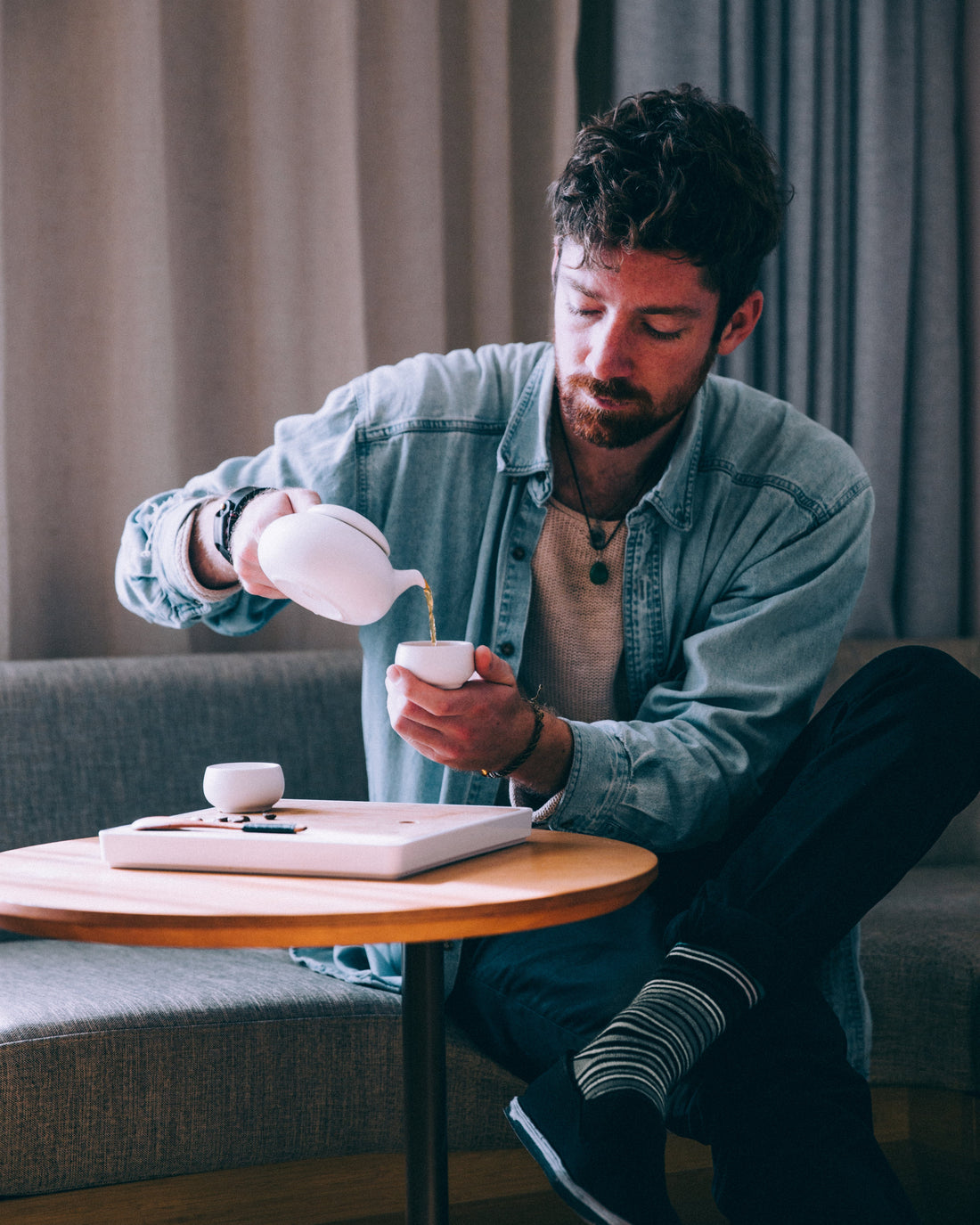
What is Yellow Tea?
Yellow tea is a rare and exquisite type of tea that bridges the gap between green and white tea. Known for its smooth, mellow flavour and delicate aroma, this tea is prized for its unique processing method and subtle sweetness. Often considered a luxury in the tea world, yellow tea offers a refined drinking experience for those who appreciate the finer things in life.
The Origins of Yellow Tea
Yellow tea has its origins in China, where it has been cultivated and consumed for centuries. It is most famously produced in the Anhui, Sichuan, and Hunan provinces, where the traditional techniques for crafting this tea have been carefully preserved. Once reserved exclusively for royalty, yellow tea remains one of the most sought-after and prestigious types of tea.
How is Yellow Tea Made?
The production of yellow tea is a meticulous and time-consuming process that sets it apart from other teas. Here are the key steps:
Plucking: Only the finest buds and young leaves are hand-picked to ensure the highest quality.
Withering: The leaves are left to wither slightly to reduce moisture content and enhance pliability.
Pan-Firing: The leaves are gently pan-fired to halt oxidation, similar to green tea.
Yellowing: This unique step involves wrapping the leaves in cloth or paper and allowing them to rest, creating a mild oxidation process that gives the tea its characteristic yellow hue and smooth flavour.
Drying: Finally, the leaves are dried to lock in their delicate flavours and aromas.
What Does Yellow Tea Taste Like?
Yellow tea is celebrated for its smooth, delicate flavour profile. It offers a mellow sweetness with subtle floral and nutty undertones. Unlike green tea, yellow tea has a less grassy and vegetal taste, making it a perfect choice for those who prefer a softer, more refined cup. The golden-yellow hue of the brew adds to its luxurious appeal.
Health Benefits of Yellow Tea
In addition to its exquisite taste, yellow tea offers a range of health benefits:
Rich in Antioxidants: Yellow tea is loaded with catechins and polyphenols, which help protect the body from oxidative stress.
Supports Digestive Health: The gentle compounds in yellow tea can aid digestion and promote gut health.
Enhances Focus and Calm: With moderate caffeine content, yellow tea provides a balanced energy boost without the jitters.
Boosts Metabolism: The natural compounds in yellow tea may support healthy metabolism and weight management.
Promotes Skin Health: The antioxidants in yellow tea can help reduce inflammation and support radiant skin.
How to Brew Yellow Tea
Brewing yellow tea requires careful attention to preserve its delicate flavour. Follow these steps:
Use Fresh Water: Heat fresh, filtered water to about 80°C–85°C (176°F–185°F).
Measure the Tea: Use about 1 teaspoon (2 grams) of yellow tea leaves per 200ml of water.
Steep: Pour the water over the tea leaves and steep for 2–4 minutes. Avoid over-steeping to prevent bitterness.
Serve: Enjoy your yellow tea plain to fully appreciate its delicate flavours.
Why Choose Yellow Tea?
Yellow tea is the perfect choice for tea connoisseurs who value quality and tradition. Its rare production process and refined flavour profile make it a standout option for special occasions or quiet moments of indulgence. With its health benefits and luxurious appeal, yellow tea is a true gem in the world of tea.
Frequently Asked Questions About Yellow Tea
Q: Is yellow tea caffeinated?
A: Yes, yellow tea contains moderate caffeine levels, offering a gentle energy boost without overstimulation.
Q: What makes yellow tea different from green tea?
A: Yellow tea undergoes an additional “yellowing” step during processing, which reduces the grassy notes of green tea and creates a smoother, mellower flavour.
Q: Can yellow tea be re-steeped?
A: Absolutely! Yellow tea leaves can be re-steeped multiple times, with each infusion revealing new layers of flavour.
Disclaimer
This article is for informational purposes only and is not a substitute for professional medical advice. Always consult a healthcare professional before adding any new teas or supplements to your diet, especially if you are pregnant, nursing, have a medical condition, or are taking medication.
The Origins of Yellow Tea
Yellow tea has its origins in China, where it has been cultivated and consumed for centuries. It is most famously produced in the Anhui, Sichuan, and Hunan provinces, where the traditional techniques for crafting this tea have been carefully preserved. Once reserved exclusively for royalty, yellow tea remains one of the most sought-after and prestigious types of tea.
How is Yellow Tea Made?
The production of yellow tea is a meticulous and time-consuming process that sets it apart from other teas. Here are the key steps:
Plucking: Only the finest buds and young leaves are hand-picked to ensure the highest quality.
Withering: The leaves are left to wither slightly to reduce moisture content and enhance pliability.
Pan-Firing: The leaves are gently pan-fired to halt oxidation, similar to green tea.
Yellowing: This unique step involves wrapping the leaves in cloth or paper and allowing them to rest, creating a mild oxidation process that gives the tea its characteristic yellow hue and smooth flavour.
Drying: Finally, the leaves are dried to lock in their delicate flavours and aromas.
What Does Yellow Tea Taste Like?
Yellow tea is celebrated for its smooth, delicate flavour profile. It offers a mellow sweetness with subtle floral and nutty undertones. Unlike green tea, yellow tea has a less grassy and vegetal taste, making it a perfect choice for those who prefer a softer, more refined cup. The golden-yellow hue of the brew adds to its luxurious appeal.
Health Benefits of Yellow Tea
In addition to its exquisite taste, yellow tea offers a range of health benefits:
Rich in Antioxidants: Yellow tea is loaded with catechins and polyphenols, which help protect the body from oxidative stress.
Supports Digestive Health: The gentle compounds in yellow tea can aid digestion and promote gut health.
Enhances Focus and Calm: With moderate caffeine content, yellow tea provides a balanced energy boost without the jitters.
Boosts Metabolism: The natural compounds in yellow tea may support healthy metabolism and weight management.
Promotes Skin Health: The antioxidants in yellow tea can help reduce inflammation and support radiant skin.
How to Brew Yellow Tea
Brewing yellow tea requires careful attention to preserve its delicate flavour. Follow these steps:
Use Fresh Water: Heat fresh, filtered water to about 80°C–85°C (176°F–185°F).
Measure the Tea: Use about 1 teaspoon (2 grams) of yellow tea leaves per 200ml of water.
Steep: Pour the water over the tea leaves and steep for 2–4 minutes. Avoid over-steeping to prevent bitterness.
Serve: Enjoy your yellow tea plain to fully appreciate its delicate flavours.
Why Choose Yellow Tea?
Yellow tea is the perfect choice for tea connoisseurs who value quality and tradition. Its rare production process and refined flavour profile make it a standout option for special occasions or quiet moments of indulgence. With its health benefits and luxurious appeal, yellow tea is a true gem in the world of tea.
Frequently Asked Questions About Yellow Tea
Q: Is yellow tea caffeinated?
A: Yes, yellow tea contains moderate caffeine levels, offering a gentle energy boost without overstimulation.
Q: What makes yellow tea different from green tea?
A: Yellow tea undergoes an additional “yellowing” step during processing, which reduces the grassy notes of green tea and creates a smoother, mellower flavour.
Q: Can yellow tea be re-steeped?
A: Absolutely! Yellow tea leaves can be re-steeped multiple times, with each infusion revealing new layers of flavour.
Disclaimer
This article is for informational purposes only and is not a substitute for professional medical advice. Always consult a healthcare professional before adding any new teas or supplements to your diet, especially if you are pregnant, nursing, have a medical condition, or are taking medication.
